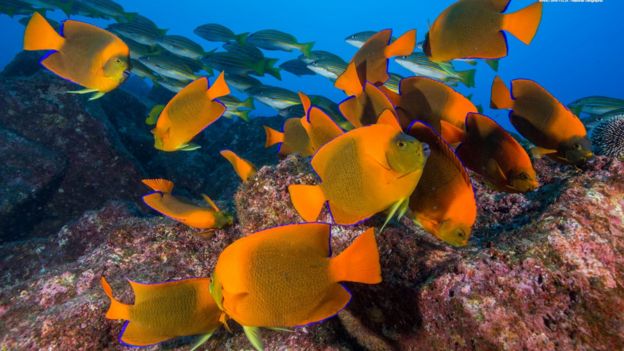
Despite being treated as humanity’s rubbish dump for decades, the oceans of the world are proving remarkably resilient, says a new scientific review. Building on that resilience could lead to a full recovery within three decades, the researchers argue.
Climate change, and the challenges of scaling up existing conservation efforts, are the big hurdles, they say.
The researchers caution that the window for action is now very narrow.
- UN panel signals red alert on ‘Blue Planet’
- Ocean plastic tide ‘violates the law’
- Ocean plastic could triple in decade
The oceans have been exploited by humans for centuries, but the negative impacts of our involvement have only become clear over the last 50 years or so.
Fish and other marine species have been hunted almost to extinction, while oil spills and other forms of pollution have poisoned the seas.
Over the last few decades, the growing influence of climate change has bleached corals, and seen the ocean’s acidity increase. This was documented in last year’s special report from the Intergovernmental Panel on Climate Change (IPCC).
This new review recognises the scale of the problems but also points to the remarkable resilience of the seas. Humpback whale numbers have rebounded since the ban on commercial whaling.
The proportion of marine species assessed as threatened with global extinction by the IUCN has dropped from 18% in 2000 to 11.4% in 2019.
“Our study documents the recovery of marine populations, habitats and ecosystems following past conservation interventions. It provides specific, evidence-based recommendations to scale proven solutions globally,” said lead author Carlos Duarte, who is professor of marine science at the King Abdullah University of Science and Technology (KAUST) in Thuwal, Saudi Arabia.
“We know what we ought to do to rebuild marine life, and we have evidence that this goal can be achieved within three decades. Indeed, this requires that we accelerate our efforts, and spread them to areas where efforts are currently modest.”
The researchers identified nine components that are key to rebuilding the oceans: salt marshes, mangroves, seagrasses, coral reefs, kelp, oyster reefs, fisheries, megafauna and the deep ocean.
The scientists recommend a range of actions that are required including protecting species, harvesting wisely and restoring habitats.

“We now have the skills and expertise to be able to restore vital marine habitats such as oyster reefs, mangrove swamps and salt marshes – which keep our seas clean, our coasts protected and provide food to support entire ecosystems,” said co-author Prof Callum Roberts from the University of York, UK.
“Science gives us reason to be optimistic about the future of our oceans, but we are not currently doing enough in the UK or globally,” he added.
A big challenge is climate change, which is raising sea levels and making the waters more acidic. The amount of warming that has already taken place will likely make rebuilding tropical reefs quite difficult.
“If we don’t tackle climate change and raise the ambition and immediacy of these efforts, we risk wasting our efforts,” said Prof Duarte.
“We also need to move closer toward reducing pressure on fish stocks, and tackle elements of pollution, such as plastic litter,”
Another big question is money. The new study estimates that it will costs $10-20bn a year to rebuild marine life by 2050. But the review also points out that for every dollar invested, the expected return would be $10.
The authors acknowledge that governments have many other issues on their minds right now but they believe that rescuing the oceans is a very achievable goal.
“Failure to embrace this challenge, and in doing so condemning our grandchildren to a broken ocean unable to support high quality livelihoods is not an option,” added Prof Duarte.
The study has been published in the journal Nature.











Social Profiles